- Home
- Albert Camus
The Fall Page 2
The Fall Read online
Page 2
My situation was more enviable. Not only did I run no risk of joining the criminal camp (in particular I had no chance of killing my wife, being a bachelor), but I even took up their defense, on the sole condition that they should be noble murderers, as others are noble savages. The very manner in which I conducted that defense gave me great satisfactions. I was truly above reproach in my professional life. I never accepted a bribe, it goes without saying, and I never stooped either to any shady proceedings. And—this is even rarer—I never deigned to flatter any journalist to get him on my side, nor any civil servant whose friendship might be useful to me. I even had the luck of seeing the Legion of Honor offered to me two or three times and of being able to refuse it with a discreet dignity in which I found my true reward. Finally, I never charged the poor a fee and never boasted of it. Don’t think for a moment, cher monsieur, that I am bragging. I take no credit for this. The avidity which in our society substitutes for ambition has always made me laugh. I was aiming higher; you will see that the expression is exact in my case.
But you can already imagine my satisfaction. I enjoyed my own nature to the fullest, and we all know that there lies happiness, although, to soothe one another mutually, we occasionally pretend to condemn such joys as selfishness. At least I enjoyed that part of my nature which reacted so appropriately to the widow and orphan that eventually, through exercise, it came to dominate my whole life. For instance, I loved to help blind people cross streets. From as far away as I could see a cane hesitating on the edge of a sidewalk, I would rush forward, sometimes only a second ahead of another charitable hand already outstretched, snatch the blind person from any solicitude but mine, and lead him gently but firmly along the crosswalk among the traffic obstacles toward the refuge of the other sidewalk, where we would separate with a mutual emotion. In the same way, I always enjoyed giving directions in the street, obliging with a light, lending a hand to heavy pushcarts, pushing a stranded car, buying a paper from the Salvation Army lass or flowers from the old peddler, though I knew she stole them from the Montparnasse cemetery. I also liked—and this is harder to say—I liked to give alms. A very Christian friend of mine admitted that one’s initial feeling on seeing a beggar approach one’s house is unpleasant. Well, with me it was worse: I used to exult. But let’s not dwell on this.
Let us speak rather of my courtesy. It was famous and unquestionable. Indeed, good manners provided me with great delights. If I had the luck, certain mornings, to give up my seat in the bus or subway to someone who obviously deserved it, to pick up some object an old lady had dropped and return it to her with a smile I knew well, or merely to forfeit my taxi to someone in a greater hurry than I, it was a red-letter day. I even rejoiced, I must admit, those days when the transport system being on strike I had a chance to load into my car at the bus stops some of my unfortunate fellow citizens unable to get home. Giving up my seat in the theater to allow a couple to sit together, hoisting a girl’s suitcases onto the rack in a train—these were all deeds I performed more often than others because I paid more attention to the opportunities and was better able to relish the pleasure they give.
Consequently I was considered generous, and so I was. I gave a great deal in public and in private. But far from suffering when I had to give up an object or a sum of money, I derived constant pleasures from this—among them a sort of melancholy which occasionally rose within me at the thought of the sterility of those gifts and the probable ingratitude that would follow. I even took such pleasure in giving that I hated to be obliged to do so. Exactitude in money matters bored me to death and I conformed ungraciously. I had to be the master of my liberalities.
These are just little touches but they will help you grasp the constant delights I experienced in my life, and especially in my profession. Being stopped in the corridor of the law courts by the wife of a defendant you represented out of justice or pity alone—I mean without charge—hearing that woman whisper that nothing, no, nothing could ever repay what you had done for them, replying that it was quite natural, that anyone would have done as much, even offering some financial help to tide over the bad days ahead, then—in order to cut the effusions short and preserve their proper resonance—kissing the hand of a poor woman and breaking away—believe me, cher monsieur, this is achieving more than the vulgar ambitious man and rising to that supreme summit where virtue is its own reward.
Let’s pause on these heights. Now you understand what I meant when I spoke of aiming higher. I was talking, it so happens, of those supreme summits, the only places I can really live. Yes, I have never felt comfortable except in lofty places. Even in the details of daily life, I needed to feel above. I preferred the bus to the subway, open carriages to taxis, terraces to closed-in places. An enthusiast for sport planes in which one’s head is in the open, on boats I was the eternal pacer of the top deck. In the mountains I used to flee the deep valleys for the passes and plateaus; I was the man of the mesas at least. If fate had forced me to choose between work at a lathe or as a roofer, don’t worry, I’d have chosen the roofs and become acquainted with dizziness. Coalbins, ships’ holds, undergrounds, grottoes, pits were repulsive to me. I had even developed a special loathing for speleologists, who had the nerve to fill the front page of our newspapers, and whose records nauseated me. Striving to reach elevation minus eight hundred at the risk of getting one’s head caught in a rocky funnel (a siphon, as those fools say!) seemed to me the exploit of perverted or traumatized characters. There was something criminal underlying it.
A natural balcony fifteen hundred feet above a sea still visible bathed in sunlight, on the other hand, was the place where I could breathe most freely, especially if I were alone, well above the human ants. I could readily understand why sermons, decisive preachings, and fire miracles took place on accessible heights. In my opinion no one meditated in cellars or prison cells (unless they were situated in a tower with a broad view); one just became moldy. And I could understand that man who, having entered holy orders, gave up the frock because his cell, instead of overlooking a vast landscape as he expected, looked out on a wall. Rest assured that as far as I was concerned I did not grow moldy. At every hour of the day, within myself and among others, I would scale the heights and light conspicuous fires, and a joyful greeting would rise toward me. Thus at least I took pleasure in life and in my own excellence.
My profession satisfied most happily that vocation for summits. It cleansed me of all bitterness toward my neighbor, whom I always obligated without ever owing him anything. It set me above the judge whom I judged in turn, above the defendant whom I forced to gratitude. Just weigh this, cher monsieur, I lived with impunity. I was concerned in no judgment; I was not on the floor of the courtroom, but somewhere in the flies like those gods that are brought down by machinery from time to time to transfigure the action and give it its meaning. After all, living aloft is still the only way of being seen and hailed by the largest number.
Besides, some of my good criminals had killed in obedience to the same feeling. Reading the newspapers afterward, in the sorry condition in which they then were, doubtless brought them a sort of unhappy compensation. Like many men, they had no longer been able to endure anonymity, and that impatience had contributed to leading them to unfortunate extremities. To achieve notoriety it is enough, after all, to kill one’s concierge. Unhappily, this is usually an ephemeral reputation, so many concierges are there who deserve and receive the knife. Crime constantly monopolizes the headlines, but the criminal appears there only fugitively, to be replaced at once. In short, such brief triumphs cost too dear. Defending our unfortunate aspirants after a reputation amounted, on the other hand, to becoming really well known, at the same time and in the same places, but by more economical means. Consequently this encouraged me to making more meritorious efforts so that they would pay as little as possible. What they were paying they were doing so to some extent in my place. The indignation, talent, and emotion I expended on them washed away, in return, an
y debt I might feel toward them. The judges punished and the defendants expiated, while I, free of any duty, shielded from judgment as from penalty, I freely held sway bathed in a light as of Eden.
Indeed, wasn’t that Eden, cher monsieur: no intermediary between life and me? Such was my life. I never had to learn how to live. In that regard, I already knew everything at birth. Some people’s problem is to protect themselves from men or at least to come to terms with them. In my case, the understanding was already established. Familiar when it was appropriate, silent when necessary, capable of a free and easy manner as readily as of dignity, I was always in harmony. Hence my popularity was great and my successes in society innumerable. I was acceptable in appearance; I revealed myself to be both a tireless dancer and an unobtrusively learned man; I managed to love simultaneously—and this is not easy—women and justice; I indulged in sports and the fine arts—in short, I’ll not go on for fear you might suspect me of self-flattery. But just imagine, I beg you, a man at the height of his powers, in perfect health, generously gifted, skilled in bodily exercises as in those of the mind, neither rich nor poor, sleeping well, and fundamentally pleased with himself without showing this otherwise than by a felicitous sociability. You will readily see how I can speak, without immodesty, of a successful life.
Yes, few creatures were more natural than I. I was altogether in harmony with life, fitting into it from top to bottom without rejecting any of its ironies, its grandeur, or its servitude. In particular the flesh, matter, the physical in short, which disconcerts or discourages so many men in love or in solitude, without enslaving me, brought me steady joys. I was made to have a body. Whence that harmony in me, that relaxed mastery that people felt, even to telling me sometimes that it helped them in life. Hence my company was in demand. Often, for instance, people thought they had met me before. Life, its creatures and its gifts, offered themselves to me, and I accepted such marks of homage with a kindly pride. To tell the truth, just from being so fully and simply a man, I looked upon myself as something of a superman.
I was of respectable but humble birth (my father was an officer), and yet, certain mornings, let me confess it humbly, I felt like a king’s son, or a burning bush. It was not a matter, mind you, of the certainty I had of being more intelligent than everyone else. Besides, such certainty is of no consequence because so many imbeciles share it. No, as a result of being showered with blessings, I felt, I hesitate to admit, marked out. Personally marked out, among all, for that long and uninterrupted success. This, after all, was a result of my modesty. I refused to attribute that success to my own merits and could not believe that the conjunction in a single person of such different and such extreme virtues was the result of chance alone. This is why in my happy life I felt somehow that that happiness was authorized by some higher decree. When I add that I had no religion you can see even better how extraordinary that conviction was. Whether ordinary or not, it served for some time to raise me above the daily routine and I literally soared for a period of years, for which, to tell the truth, I still long in my heart of hearts. I soared until the evening when … But no, that’s another matter and it must be forgotten. Anyway, I am perhaps exaggerating. I was at ease in everything, to be sure, but at the same time satisfied with nothing. Each joy made me desire another. I went from festivity to festivity. On occasion I danced for nights on end, ever madder about people and life. At times, late on those nights when the dancing, the slight intoxication, my wild enthusiasm, everyone’s violent unrestraint would fill me with a tired and overwhelmed rapture, it would seem to me—at the breaking point of fatigue and for a second’s flash—that at last I understood the secret of creatures and of the world. But my fatigue would disappear the next day, and with it the secret; I would rush forth anew. I ran on like that, always heaped with favors, never satiated, without knowing where to stop, until the day—until the evening rather when the music stopped and the lights went out. The gay party at which I had been so happy … But allow me to call on our friend the primate. Nod your head to thank him and, above all, drink up with me, I need your understanding.
I see that that declaration amazes you. Have you never suddenly needed understanding, help, friendship? Yes, of course. I have learned to be satisfied with understanding. It is found more readily and, besides, it’s not binding. “I beg you to believe in my sympathetic understanding” in the inner discourse always precedes immediately “and now, let’s turn to other matters.” It’s a board chairman’s emotion; it comes cheap, after catastrophes. Friendship is less simple. It is long and hard to obtain, but when one has it there’s no getting rid of it; one simply has to cope with it. Don’t think for a minute that your friends will telephone you every evening, as they ought to, in order to find out if this doesn’t happen to be the evening when you are deciding to commit suicide, or simply whether you don’t need company, whether you are not in a mood to go out. No, don’t worry, they’ll ring up the evening you are not alone, when life is beautiful. As for suicide, they would be more likely to push you to it, by virtue of what you owe to yourself, according to them. May heaven protect us, cher monsieur, from being set on a pedestal by our friends! Those whose duty is to love us—I mean relatives and connections (what an expression!)—are another matter. They find the right word, all right, and it hits the bull’s-eye; they telephone as if shooting a rifle. And they know how to aim. Oh, the Bazaines!
What? What evening? I’ll get to it, be patient with me. In a certain way I am sticking to my subject with all that about friends and connections. You see, I’ve heard of a man whose friend had been imprisoned and who slept on the floor of his room every night in order not to enjoy a comfort of which his friend had been deprived. Who, cher monsieur, will sleep on the floor for us? Whether I am capable of it myself? Look, I’d like to be and I shall be. Yes, we shall all be capable of it one day, and that will be salvation. But it’s not easy, for friendship is absent-minded or at least unavailing. It is incapable of achieving what it wants. Maybe, after all, it doesn’t want it enough? Maybe we don’t love life enough? Have you noticed that death alone awakens our feelings? How we love the friends who have just left us? How we admire those of our teachers who have ceased to speak, their mouths filled with earth! Then the expression of admiration springs forth naturally, that admiration they were perhaps expecting from us all their lives. But do you know why we are always more just and more generous toward the dead? The reason is simple. With them there is no obligation. They leave us free and we can take our time, fit the testimonial in between a cocktail party and a nice little mistress, in our spare time, in short. If they forced us to anything, it would be to remembering, and we have a short memory. No, it is the recently dead we love among our friends, the painful dead, our emotion, ourselves after all!
For instance, I had a friend I generally avoided. He rather bored me, and, besides, he was something of a moralist. But when he was on his deathbed, I was there—don’t worry. I never missed a day. He died satisfied with me, holding both my hands. A woman who used to chase after me, and in vain, had the good sense to die young. What room in my heart at once! And when, in addition, it’s a suicide! Lord, what a delightful commotion! One’s telephone rings, one’s heart overflows, and the intentionally short sentences yet heavy with implications, one’s restrained suffering and even, yes, a bit of self-accusation!
That’s the way man is, cher monsieur. He has two faces: he can’t love without self-love. Notice your neighbors if perchance a death takes place in the building. They were asleep in their little routine and suddenly, for example, the concierge dies. At once they awake, bestir themselves, get the details, commiserate. A newly dead man and the show begins at last. They need tragedy, don’t you know; it’s their little transcendence, their apéritif. Moreover, is it mere chance that I should speak of a concierge? I had one, really ill favored, malice incarnate, a monster of insignificance and rancor, who would have discouraged a Franciscan. I had even given up speaking to him, but by his mere
existence he compromised my customary contentedness. He died and I went to his funeral. Can you tell me why?
Anyway, the two days preceding the ceremony were full of interest. The concierge’s wife was ill, lying in the single room, and near her the coffin had been set on sawhorses. Everyone had to get his mail himself. You opened the door, said “Bonjour, madame,” listened to her praise of the dear departed as she pointed to him, and took your mail. Nothing very amusing about that. And yet the whole building passed through her room, which stank of carbolic acid. And the tenants didn’t send their servants either; they came themselves to take advantage of the unexpected attraction. The servants did too, of course, but on the sly. The day of the funeral, the coffin was too big for the door. “O my dearie,” the wife said from her bed with a surprise at once delighted and grieved, “how big he was!” “Don’t worry, madame,” replied the funeral director, “we’ll get him through edgewise, and upright.” He was got through upright and then laid down again, and I was the only one (with a former cabaret doorman who, I gathered, used to drink his Pernod every evening with the departed) to go as far as the cemetery and strew flowers on a coffin of astounding luxury. Then I paid a visit to the concierge’s wife to receive her thanks expressed as by a great tragedienne. Tell me, what was the reason for all that? None, except the apéritif.
I likewise buried an old fellow member of the Lawyers’ Guild. A clerk to whom no one paid attention, but I always shook his hand. Where I worked I used to shake everyone’s hand, moreover, being doubly sure to miss no one. Without much effort, such cordial simplicity won me the popularity so necessary to my contentment. For the funeral of our clerk the President of the Guild had not gone out of his way. But I did, and on the eve of a trip, as was amply pointed out. It so happened that I knew my presence would be noticed and favorably commented on. Hence, you see, not even the snow that was falling that day made me withdraw.

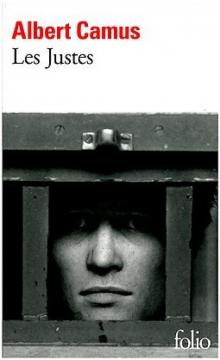 Les Justes
Les Justes The Sea Close By
The Sea Close By The Stranger
The Stranger The Rebel: An Essay on Man in Revolt
The Rebel: An Essay on Man in Revolt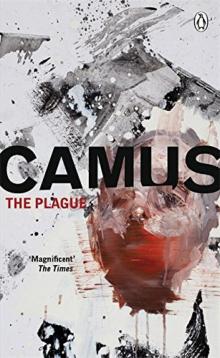 The plague
The plague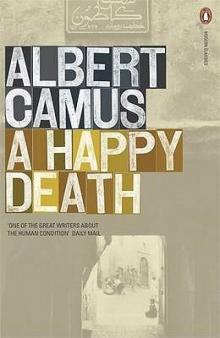 A Happy Death
A Happy Death The Myth of Sisyphus and Other Essays
The Myth of Sisyphus and Other Essays The Fall
The Fall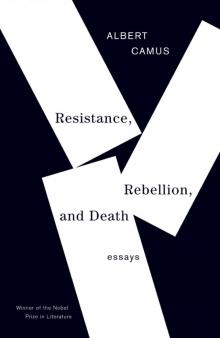 Resistance, Rebellion, and Death
Resistance, Rebellion, and Death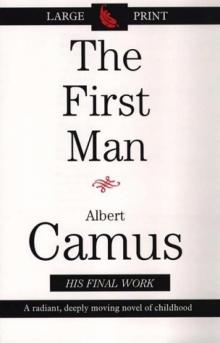 The First Man
The First Man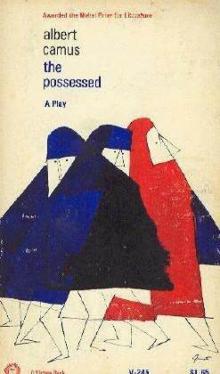 The Possessed
The Possessed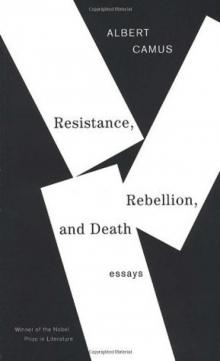 Resistance, Rebellion and Death: Essays
Resistance, Rebellion and Death: Essays